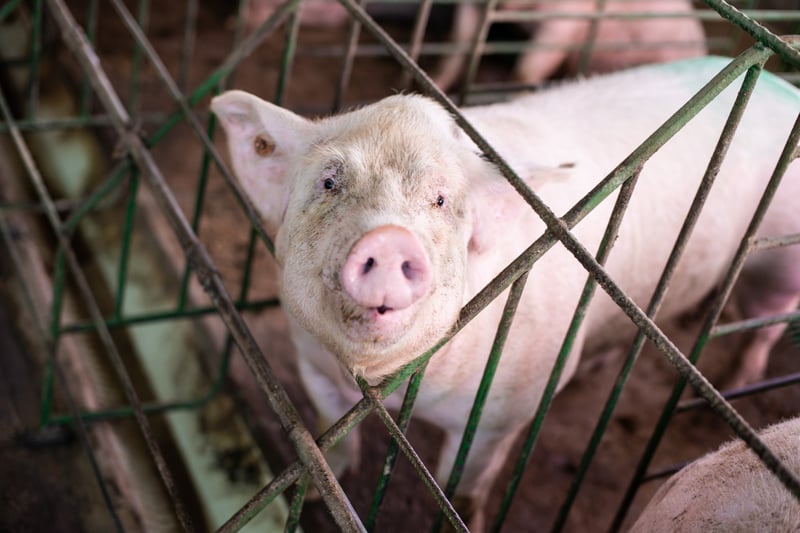
To protect the planet, we need to protect farmed animals.
According to a CGS survey, more than two-thirds of Americans consider sustainability when making a purchase and are willing to pay more for “sustainable” products. But how does this decision-making factor into our food choices? You see, what most people say they want and what they actually do are two very different things. However, this change is slowly taking place as Americans wake up to the harsh realities of factory farming and discover it’s quite literally killing our planet. Unsure how? Keep reading to learn more about factory farming and the environment.
Factory Farming and Water Pollution
In 2017 it was reported that toxins from factory farms runoff had caused the largest dead zone in US history in the Gulf of Mexico. At more than 8,000 square miles, no marine life can survive due to toxic fertilizer pollution from intensive animal agricultural facilities. You see, when manure and fertilizer leak into nearby waterways, it promotes the growth of algae blooms, which create oxygen-deprived zones that cause marine life to flee or die.
The environmental group Mighty Earth released a 2017 report that identified Tyson Foods, one of America’s largest chicken producers, as a “dominant” contributor to the pollution crisis. Similarly, another report from Environment America alleged that Tyson is responsible for dumping more toxic pollutants into our waterways than companies like ExxonMobil and Dow Chemical.
In addition to polluting waterways and fragile ecosystems, the toxins from factory farms contaminate our drinking water. A report from Environmental Working Group found that systems supplying drinking water to more than 200 million Americans contain dangerously high levels of nitrates from fertilizer pollution, which have been linked to an increased risk of developing certain cancers. Unfortunately, the communities often most impacted by this are low income and communities of color, making factory farming’s environmental impact a critical environmental justice issue that’s often overlooked by the federal government.
Factory Farming and Air Pollution
Sadly, it’s not just our water that factory farming is destroying—it’s our air, too. While most meat and dairy companies intentionally do not publish their climate emissions, making it almost impossible to know the exact amount of greenhouse gas generated, in 2017, The Guardian attempted to calculate the air pollution impact from animal agriculture.
Using the most comprehensive data from the Food and Agriculture Organization of the United Nations, The Guardian estimated that the top 20 meat and dairy companies emitted more greenhouse gas in 2016 than all of Germany, Europe’s biggest climate polluter. This means if these companies were their own country, they would be the world’s seventh-largest contributor of greenhouse gases. What’s more, three of the world’s largest meat producers, JBS, Cargill, and Tyson, emitted nearly as many greenhouse gases as the biggest oil companies, including Exxon, BP, and Shell.
Land Usage From Factory Farms
The United States has five times as many livestock animals as humans, and it takes a lot of land to grow feed for the meat that ends up on our plates. The production of corn and soy takes up more than a third of America’s agricultural land, despite humans consuming less than 10 percent of it. Livestock consumes the vast majority of these crops.
According to an article published in The Guardian, researchers at Oxford University found that without meat and dairy consumption we could use around 75 percent less land for agriculture. That’s comparable to the size of the United States, China, Australia, and the whole European Union combined. So, in addition to destroying Earth’s water and air, raising animals for meat on a massive scale uses countless acres of land, destroying vital ecosystems, harming wildlife and biodiversity.
What You Can Do to Protect the Environment
The amount of meat we’re eating is killing us and our planet. But by reducing our meat consumption, we can turn the tide—not to mention improving the lives of billions of animals at factory farms. Meat reduction and shifting to more sustainable and kinder practices have the potential to put an end to many cruel industrial farming practices, such as extreme confinement, the overuse of antibiotics, and brutal mutilations.
Thankfully there’s already a global shift away from factory-farmed meat and towards plant-based eating. Driving this progress is companies meeting their customers’ concerns about the planet, their health, and animal welfare. According to a Mintel report on dining out, more than one in five diners want restaurants to offer more plant-based entrees. A report just released by Renub Research predicts the global plant-based meat market to be worth more than $7 billion by the end of 2025.
So what can you do to reduce factory farming’s environmental impact, help save animals from factory farms, and be more sustainable? By eating fewer animal products and only consuming meat from small family farms, you can help protect the planet, your health, and countless animals.